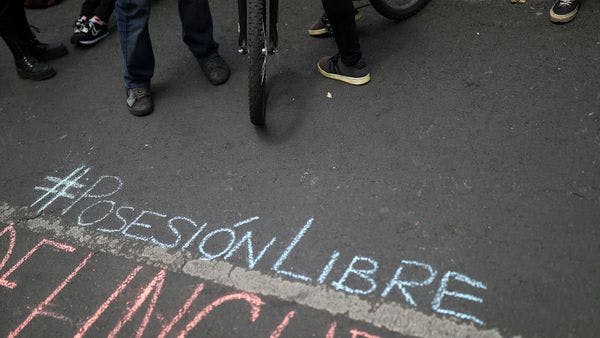The Mexican Supreme Court's contradiction: Yes to cannabis use, no to possessing it
By Frida Ibarra, Director of Advocacy at México Unido Contra la Delincuencia (MUCD) - @FridaniIbarra
Édgar is a young man who, while riding his skateboard through the streets of one of the most popular neighbourhoods in Mexico City, was arrested by the police for carrying cannabis and sentenced to trial for the crime of simple possession. Since September 2018, Mexico United Against Crime (MUCD) took up his defence and filed an injunction in which it claims that this crime is unconstitutional. In our opinion, the case perfectly exemplifies the contradiction in which Mexico has been living since 2015, when the Supreme Court recognised that the adult consumption of cannabis is protected by the right to the free development of personality, while the law continues to criminalise the act necessary to do so: possession. This legal tension requires resolution, as it is not possible to consume without possessing.
The new 'guiding principle' of the Supreme Court
On 11 May, this case was resolved by the First Chamber of the Supreme Court of Justice of the Nation (SCJN). In a highly regrettable decision, the court approved a draft that maintains the crime of simple possession of cannabis, which punishes the possession of cannabis without intent to sell or supply up to 5 kg. Without any real justification, the Court decided not to analyse this offence, but to consider 'excluding conditions' for the offence of simple possession, which allow the Public Prosecutor's Office to decide not to bring the case before a judge and to release the person if certain requirements are met:
- that the person is in possession of 5 grams or less of cannabis;
- the person is a drug addict or user; and;
- the person is outside a radius of 300 metres from educational, welfare, police or detention centres.
The approved decision proposes removing the limit of 5 grams from the 'excluding conditions' and that the Public Prosecutor's Office, or the court, should determine, on a case-by-case basis, when a person is a cannabis user and when they are not. This means that it will not matter if the person was found with more than 5 grams of cannabis for the Public Prosecutor's Office to drop prosecutions. Fortunately, the bill only received three votes in favour from the ministers that make up the First Chamber, meaning that the decision will only be a guiding principle, but not a binding precedent for the rest of the judges.
Why is the Court's decision a serious ommission?
First, because it gives the Public Ministry enormous discretion in the way cases of simple possession are dealt with. It will be the same authority that will have the ability to arrest and punish people for their consumption and, in turn, classify people according to its own widely documented prejudices.
Second, because by not eliminating the offence of simple possession, the problems that this offence generates will still persist: people will continue to be detained by the police for up to 48 hours while it is determined whether the possession was for personal use or not; they will continue to be extorted by the authorities, arbitrarily detained, subjected to ill-treatment and torture at the time of arrest and, in the worst cases, unjustly imprisoned. In particular, young people from low-income backgrounds and with basic education. In 2020, 70% of those detained for simple possession had a high school education or less, 57% earned less than $374 and 48% were aged 18-34.
Third, because the resources of criminal justice authorities will continue to be wasted on prosecuting people who use drugs, instead of dealing with crimes that truly cause social harm. In 2020 alone, more investigation files and preliminary investigations were opened for the crime of simple possession than for the crime of homicide in Mexico.
In sum, the SCJN's decision is lukewarm and inconsistent. On the one hand, the resolution is lukewarm because seven years after the first ruling that recognised the right of people to consume cannabis (SMART injunction), the Supreme Court continues to dodge the question and does not dare to declare the offence of simple possession unconstitutional, even when it recognises that criminalising this conduct violates the right to free development of the personality, since by definition personal consumption requires possession; it does not serve to protect public health, as it does not concern behaviours that affect the health of others; and it accepts that criminal intervention in the case of possession of cannabis for personal use is an arbitrary interference in the dignity, private life and autonomy of the person.
On the other hand, the decision is incongruous because the highest constitutional court missed a valuable opportunity to resolve the contradiction of being able to consume without being able to possess, and rendering impossible the exercise of an already recognised right by determining that the absolute prohibition of cannabis use is unconstitutional.
The continuation of a legacy of institutional neglect
Thus, people who use cannabis will continue to be criminalised in Mexico, with a Congress that does not regulate, an administrative authority (COFEPRIS) that obstructs the issuing of permits for personal use, and a Court that demonstrates its complete detachment from the reality experienced by the most vulnerable people in Mexico, leaving the selective application of the law to the same authorities who discriminate, extort, abuse and torture.
